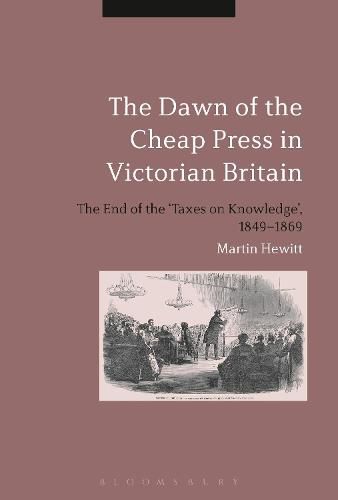Readings Newsletter
Become a Readings Member to make your shopping experience even easier.
Sign in or sign up for free!
You’re not far away from qualifying for FREE standard shipping within Australia
You’ve qualified for FREE standard shipping within Australia
The cart is loading…






The Dawn of the Cheap Press provides the first detailed study of the mid-Victorian campaign for the repeal of the taxes on knowledge for over a hundred years. Using the recently discovered papers of the Association for the Promotion of the Repeal of the Taxes on Knowledge and taking advantage of new forms of research made possible by the digitisation of nineteenth century newspapers, it assesses the impact of the removal of the last surviving legal disabilities on the newspaper industry, the nature of journalism, and the cultures and practices of newspaper reading. The book demonstrates that the campaign against the taxes on knowledge retained broad popular appeal, and played an important role in the politics of mid-Victorian budgets. It not only makes a seminal contribution to the history of the nineteenth century press and print culture, but also illuminates the culture and politics of mid-Victorian Britain, offers an important re-reading of the history of extra-parliamentary pressure group politics and provides new insights into the origins of Gladstonian Liberalism.
$9.00 standard shipping within Australia
FREE standard shipping within Australia for orders over $100.00
Express & International shipping calculated at checkout
The Dawn of the Cheap Press provides the first detailed study of the mid-Victorian campaign for the repeal of the taxes on knowledge for over a hundred years. Using the recently discovered papers of the Association for the Promotion of the Repeal of the Taxes on Knowledge and taking advantage of new forms of research made possible by the digitisation of nineteenth century newspapers, it assesses the impact of the removal of the last surviving legal disabilities on the newspaper industry, the nature of journalism, and the cultures and practices of newspaper reading. The book demonstrates that the campaign against the taxes on knowledge retained broad popular appeal, and played an important role in the politics of mid-Victorian budgets. It not only makes a seminal contribution to the history of the nineteenth century press and print culture, but also illuminates the culture and politics of mid-Victorian Britain, offers an important re-reading of the history of extra-parliamentary pressure group politics and provides new insights into the origins of Gladstonian Liberalism.